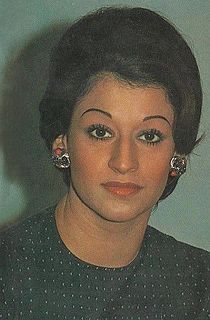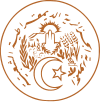Related Research Articles

Algeria, officially the People's Democratic Republic of Algeria, is a country in the Maghreb region of North Africa. The country is the largest country by total area in Africa and in the Arab world, and is bordered to the northeast by Tunisia; to the east by Libya; to the southeast by Niger; to the southwest by Mali, Mauritania, and Western Sahara; to the west by Morocco; and to the north by the Mediterranean Sea. It has a semi-arid geography, with most of the population living in the fertile north and the Sahara dominating the geography of the south. Algeria covers an area of 2,381,741 square kilometres (919,595 sq mi), making it the world's tenth largest nation by area, and the largest nation in Africa. With a population of 44 million, Algeria is the ninth-most populous country in Africa, and the 32nd-most populous country in the world. The capital and largest city is Algiers, located in the far north on the Mediterranean coast.

This article is about the demographic features of the population of Algeria, including population density, ethnicity, education level, health of the populace, economic status, religious affiliations and other aspects of the population.

Abdelaziz Bouteflika was an Algerian politician and diplomat who served as President of Algeria from 1999 to his resignation in 2019.

Warda Al-Jazairia was an Algerian-Lebanese singer. She was well known for her Egyptian Arabic songs and music. Her name literally meant Warda the Algerian, but she was sometimes referred to as just Warda or as "The Algerian Rose" in the Arab world.

Sonatrach is the national state-owned oil company of Algeria. Founded in 1963, it is known today to be the largest company in Africa with 154 subsidiaries, and often referred as the first African oil "major".
Mass media in Morocco includes newspapers, radio, television, and the Internet.
The working conditions of journalists in Algeria have evolved since the 1962 independence. After 1990, the Code of Press was suppressed, allowing for greater freedom of press. However, with the civil war in the 1990s, more than 70 journalists were assassinated by Terrorists. Sixty journalists were killed between 1993 and 1998 in Algeria.

Algeria has more than 45 independent Arabic language and French language publications as well as 4 government-owned newspapers, but the government controls most printing presses and advertising. The Algerian newspapers with the largest circulations are Echourouk (1,800,000), Ennahar (1,600,000), El Khabar (1,000,000) and Quotidien d'Oran (700,000); all four are employee-owned. In 2004 and 2005, the government increased the access of Berber language and culture to both print and broadcast media.

Algeria is the largest country in Africa; one of the main tourist attractions is the Sahara, the second largest desert in the world. Algeria has been a member of the World Tourism Organization since 1976. According to a report of the World Tourism Organization published in 2014, Algeria was the 4th largest tourist destination in Africa in 2013 with 2,7 million foreign tourists, and ranks 111th on the international tourism scene, according to the London-based World Tourism and Travel Council (WTTC). The tourism sector in Algeria accounts for 3.9% of the volume of exports, 9.5% of the productive investment rate and 8.1% of the gross domestic product.

Public Establishment of Television, abbreviated as EPTV, is a state-owned company that manages the activity of television in Algeria, going from production to broadcasting.
TV2, formerly Canal Algérie ,in English means The Algerian channel, is the second Algerian general public national television channel. The channel is part of the EPTV Group which also includes TV1, TV3, TV4, TV5, TV6, TV7 and TV8. The channel broadcasts its programs 24/7 via different platforms and all over the world.

The 2010–2012 Algerian protests were a series of protests taking place throughout Algeria, lasting from 28 December 2010 to early 2012. The protests had been inspired by similar protests across the Middle East and North Africa. Causes cited by the protesters included unemployment, the lack of housing, food-price inflation, corruption, restrictions on freedom of speech and poor living conditions. While localized protests were already commonplace over previous years, extending into December 2010, an unprecedented wave of simultaneous protests and riots, sparked by sudden rises in staple food prices, erupted all over the country starting in January 2011. These were quelled by government measures to lower food prices, but were followed by a wave of self-immolations, most of them in front of government buildings. Opposition parties, unions, and human rights organisations then began to hold weekly demonstrations, despite these being illegal without government permission under the ongoing state of emergency; the government suppressed these demonstrations as far as possible, but in late February yielded to pressure and lifted the state of emergency. Meanwhile, protests by unemployed youth, typically citing unemployment, hogra (oppression), and infrastructure problems, resumed, occurring almost daily in towns scattered all over the country.

Abdelmadjid Tebboune is an Algerian politician currently serving as the President of Algeria since December 2019 and as Minister of Defence. He took over the power from former President Abdelaziz Bouteflika and former Acting Head of State Abdelkader Bensalah. Previously, he was Prime Minister of Algeria from May 2017 to August 2017. In addition, he was also Minister of Housing from 2001 to 2002 for a year and again from 2012 to 2017 for 5 years.

The 2019–2021 Algerian protests, also called Revolution of Smiles or Hirak Movement, began on 16 February 2019, six days after Abdelaziz Bouteflika announced his candidacy for a fifth presidential term in a signed statement. These protests, without precedent since the Algerian Civil War, were peaceful and led the military to insist on Bouteflika's immediate resignation, which took place on 2 April 2019. By early May, a significant number of power-brokers close to the deposed administration, including the former president's younger brother Saïd, had been arrested.
Fodil Mezali is an Algerian journalist, editor-in-chief and managing editor.

Algerian Broadcasting Company is an undertaking for the broadcasting of radio and television services in Algeria. TDA is a so-called public industrial and commercial company (EPIC), which means that it is an independent legal entity that manages a public service. TDA also offers internet, technical and satellite services. Algeria's Ministry of Communications is the supervisory authority for the TDA.
Ammar Belhimer is an Algerian public law teacher and journalist, who became Minister of Communication and spokesperson for the first Djerad government on 4 January 2020. then from the first Benabderrahmane government from January 4, 2020 to November 11, 2021.
